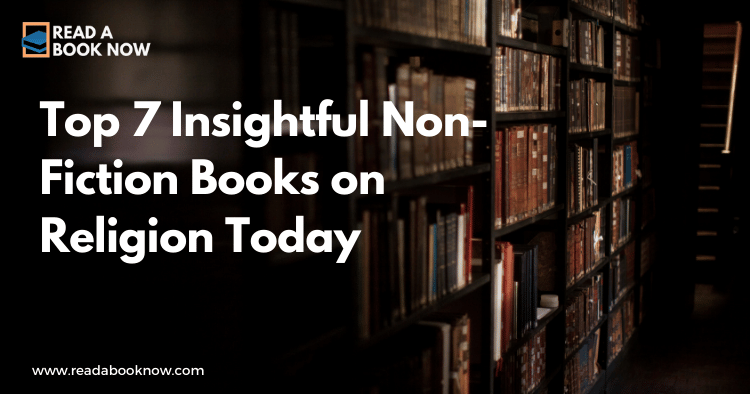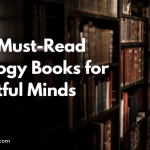Table of Contents
- Introduction
- 1. “The God Delusion” by Richard Dawkins
- 2. “Sapiens: A Brief History of Humankind” by Yuval Noah Harari
- 3. “The Anatomy of Violence” by Adrian Raine
- 4. “God Is Not Great” by Christopher Hitchens
- 5. “The Book of Joy” by Dalai Lama and Desmond Tutu
- 6. “Religion: A Very Short Introduction” by Thomas A. Tweed
- 7. “The Secular Age” by Charles Taylor
- Conclusion
- FAQs
Introduction
Religion continues to shape our societies, cultures, and personal lives, acting as a guiding force for billions around the globe. In an age where information is more accessible than ever, understanding the complexities of religious beliefs and their impacts is crucial. Whether you are a believer, an agnostic, or an atheist, these seven insightful non-fiction books will deepen your understanding of religion in today’s world.
1. “The God Delusion” by Richard Dawkins
Richard Dawkins’ “The God Delusion” is a provocative examination of religion and its influence on society. Dawkins argues against the existence of a supernatural deity, offering scientific explanations for the phenomena often attributed to divine intervention. The book is a call to reason, encouraging readers to embrace skepticism and critical thinking.
“Science and religion are incompatible, particularly when it comes to explaining the universe’s mysteries.”
Dawkins employs wit and clarity, making complex ideas accessible to the average reader. He discusses the implications of religious beliefs on morality and society, prompting essential questions about faith and reason. This book is not just for atheists; it’s a thought-provoking read for anyone interested in the intersection of science and religion.
Key Takeaway: “The God Delusion” challenges readers to critically evaluate their beliefs, encouraging a rational approach to understanding the universe.
More about Richard Dawkins’ work
2. “Sapiens: A Brief History of Humankind” by Yuval Noah Harari
In “Sapiens,” Yuval Noah Harari explores the history of humanity from the Stone Age to the modern era, examining how religion has played a pivotal role in shaping societies. Harari argues that shared beliefs, including religious ones, are what bind large groups of people together, allowing for cooperation and the building of complex societies.
“Beliefs are the glue that holds societies together—whether they be religious or secular.”
This book offers a broader perspective on religion’s impact on human history, linking it to economics, politics, and culture. Harari’s engaging narrative and skillful storytelling make this a captivating read that transcends traditional boundaries.
Key Takeaway: “Sapiens” provides a panoramic view of how religion has influenced human development, offering insights into our past and future.
Explore more about Yuval Noah Harari
3. “The Anatomy of Violence” by Adrian Raine
In “The Anatomy of Violence,” Adrian Raine investigates the biological and environmental factors that contribute to violent behavior, challenging the notion that religion is solely responsible for violence. Raine combines neuroscience, psychology, and sociology to explore how various influences shape human behavior.
“Violence is a complex interplay of biology and environment, often overshadowing simplistic narratives that blame religion.”
This book is crucial for anyone looking to understand the complexities of violence in the context of human behavior, moving beyond simplistic explanations that often blame religion. Raine’s research offers a nuanced perspective that is both informative and enlightening.
Key Takeaway: “The Anatomy of Violence” provides a scientific lens through which to examine the roots of violence, separating myth from reality in the context of religion.
Learn more about Adrian Raine’s research
4. “God Is Not Great” by Christopher Hitchens
Christopher Hitchens’ “God Is Not Great” is a passionate critique of religion, arguing that it is more often a source of conflict than a pathway to peace. Hitchens, known for his eloquent prose and sharp wit, presents a case against the religious dogma that he believes hinders human progress.
“Religion poisons everything, from human relationships to societal progress.”
The book delves into historical examples of religiously motivated violence and oppression, challenging readers to reconsider the role of religion in modern society. Hitchens’ arguments are provocative and invite readers to engage in deep reflection about their beliefs.
Key Takeaway: “God Is Not Great” serves as a fearless indictment of religion, inviting critical examination of faith’s role in society.
Discover more about Christopher Hitchens
5. “The Book of Joy” by Dalai Lama and Desmond Tutu
In sharp contrast to the previous titles, “The Book of Joy” offers a heartwarming exploration of spirituality through the lens of two revered spiritual leaders, the Dalai Lama and Archbishop Desmond Tutu. The book documents their conversations on joy, suffering, and the human spirit, emphasizing the importance of compassion and connection.
“Joy is a product of compassion and understanding, transcending religious differences.”
This uplifting read highlights how spiritual practices can lead to a deeper understanding of joy and fulfillment, regardless of religious affiliation. It serves as a reminder that, at its best, religion can promote peace, love, and understanding.
Key Takeaway: “The Book of Joy” illustrates how spirituality can foster happiness and resilience, transcending religious boundaries.
Read more about the Dalai Lama | Learn about Desmond Tutu
6. “Religion: A Very Short Introduction” by Thomas A. Tweed
Thomas A. Tweed’s “Religion: A Very Short Introduction” is an excellent starting point for anyone looking to understand the intricate tapestry of world religions. This concise guide provides an overview of key concepts, beliefs, and practices across various faiths, making it accessible to all readers.
“Understanding religion requires a journey through its diverse expressions and interpretations.”
Tweed encourages readers to appreciate the diversity of religious expression and the role of religion in contemporary society. This book serves as a solid foundation for further exploration into religious studies.
Key Takeaway: “Religion: A Very Short Introduction” provides an accessible overview of world religions, perfect for those new to the topic.
Explore more about Thomas A. Tweed
7. “The Secular Age” by Charles Taylor
In “The Secular Age,” Charles Taylor examines how secularism has transformed the landscape of belief and spirituality. He argues that modern societies have shifted away from a “porous” worldview—where the sacred and the secular coexist—to a more “buffered” one, where people often see religion as an option rather than a necessity.
“In a secular age, belief becomes a choice rather than an obligation.”
This profound exploration of secularism encourages readers to consider how these changes affect individual and collective identities. Taylor’s work is essential for understanding contemporary religious dynamics in a rapidly changing world.
Key Takeaway: “The Secular Age” offers a thought-provoking analysis of the transition to secularism, challenging readers to rethink their understanding of belief.
Learn more about Charles Taylor
Conclusion
These seven insightful non-fiction books on religion provide a diverse range of perspectives, from critiques of faith to explorations of spirituality and secularism. Whether you seek to challenge your beliefs or deepen your understanding, each book offers valuable insights into the complex world of religion today.
“Engaging with these works is not just an intellectual exercise; it’s an invitation to explore the profound questions of existence.”
For further exploration of literature that challenges and enriches our understanding of culture and human experience, consider checking out 10 Must-Read Feminist Classics That Changed Literature.
FAQs
1. What makes these books essential for understanding religion today?
These books cover a variety of perspectives—criticism, history, spirituality, and sociology—offering a comprehensive view of how religion impacts society and individual lives.
2. Are these books suitable for everyone?
Yes! While some books may challenge traditional beliefs, they are written in an engaging manner that invites readers from all backgrounds to explore the subject.
3. Where can I find these books?
You can find these titles at local bookstores, online retailers like Amazon, or at your local library.
4. How do I choose the right book for me?
Consider your interests




